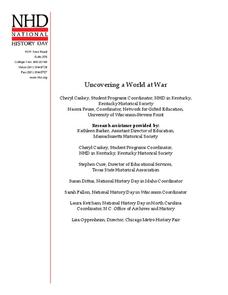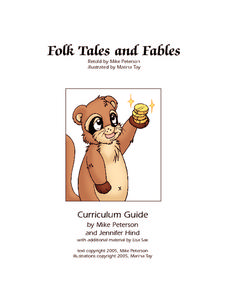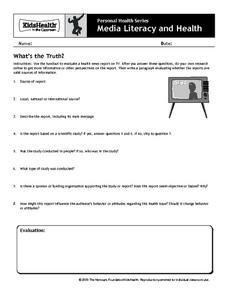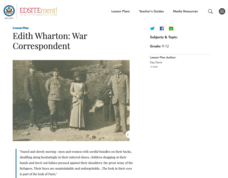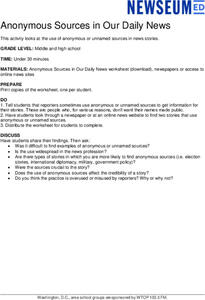West Virginia Department of Education
Intelligence of Authentic Character - News Coverage and John Brown's Raid
The resource, a standalone, shows how news coverage of John Brown's Raid began when the event happened and how that reporting shaped perception in West Virginia history. The resource includes interesting anticipatory discussion...
iCivics
Step Two: The News and You
With so many news resources, scholars likely feel incredibly confused about what the news means. Pupils participate in reading activities, fill out graphic charts, answer questions on worksheets, and complete a quick write activity.
National History Day
Uncovering a World at War
Has media always had an influence on public policy? After researching and reading news articles written during World War I, learners understand the influence of communication and media. They discuss articles in small groups and as a...
Curated OER
Writing a News Article
Join the newspaper business with a series of lessons and exercises focused on elements of journalism. The packet focuses on distinguishing fact from opinion, writing effective headlines, sequencing events, and editing and...
Madison Public Schools
Journalism
Whether you are teaching a newspaper unit in language arts, covering the First Amendment and censorship in social studies, or focusing on writing ethics in journalism, a unit based on the foundations of journalism would be an excellent...
Read It Later, Inc
Can't read this now, I'll have to check it out later. A teacher's time is always limited. So often as we peruse the web for personal and professional content, we come across sites and information that we cannot immediately...
Weekly Story Book
Folk Tales and Fables
Pages and pages of engaging activities, worksheets, and writing projects on teaching folktales and fables await you! You don't want to miss this incredible resource that not only includes a wide range of topics and graphic...
Associated Press
AP News
A respected source of local and global news, you can trust this app to provide breaking stories and current events. The interface is highly visual and easy to navigate.
Curated OER
How Often Do You Interact with People of Another Race or Ethnicity?
Is interacting with people from different backgrounds part of a well-rounded education? A big question awaits young readers as they explore two New York Times articles that discuss modern-day segregation, population statistics, and...
Curated OER
What We Eat, Where We Sleep: Documenting Daily Life to Tell Stories
This is not just a New York Time article to read, this is a set of amazing activity ideas all related to the slide shows "Breaking Bread Everywhere" and "Where Children Sleep." Your class can view each show, read about what they mean...
Curated OER
Math News
Young writers design and publish a newsletter with articles that demonstrate knowledge of mathematical concepts. They explain mathematical procedures and basic operations in a news article format. Next, they compile several articles to...
Nemours KidsHealth
Media Literacy and Health: What’s the Truth?
In this personal health media literacy worksheet, high schoolers use the eight questions on this sheet to evaluate a health news report on television. Students write paragraphs the determine whether the reports are valid sources of...
Carolina K-12
The Revolutionary Times
Be sure to grab a copy of the Revolutionary Times! Scholars take a step back in time to report on topics set in the revolutionary period. Events include the ride of Paul Revere, the Battle of Saratoga, and more.
National Endowment for the Humanities
Edith Wharton: War Correspondent
Students research how the field of war correspondence has evolved. Young historians read chapter's from Edith Wharton's book Fighting France, From Dunkerque to Belfort. Students investigate an American correspondents' experiences during...
K20 LEARN
The K20 Chronicle, Lesson 3: Crafting the Article
Picture your class members as photojournalists! Using their interview with a senior as a starting point, would-be photojournalists begin developing an outline for their article by examining their notes from the interview, gathering...
K20 LEARN
The K20 Chronicle, Lesson 1: What Makes a Good Article?
Good news articles are engaging, informative, and often compelling. In the first lesson plan of the four-part series, young journalists analyze and evaluate news stories about former NBA player Enes Kanter Freedom. They learn about...
Newseum
Is It Fair?
Young journalists learn how to analyze word choice, context, and counterpoints to judge the fairness of a news story. They practice using these tools to judge a series of headlines for the story of Goldilocks and the Three Bears. They...
Newseum
Bias Through History: Analyzing Historical Sources
Young journalists use the E.S.C.A.P.E. (evidence, source, context, audience, purpose, and execution) strategy to evaluate historical and contemporary examples of bias in the news. The class then uses the provided discussion questions to...
Newseum
The Press and the Presidency: Friend or Foe? How the President Is Portrayed
In theory, news reports should be fair and unbiased. Young journalists test this theory by selecting a current news story covered by various media outlets about the President of the United States. They then locate and analyze five...
Newseum
Anonymous Sources in Our Daily News
Young journalists search for two examples of news stories, either published or online, that use anonymous or unnamed sources. They then consider the possible motives for why the sources remain unidentified, the types of stories that use...
Facebook
The Verification Steps
Provenance, source, date, location, and motivation. High schoolers learn how to verify the authenticity of news stories and posts by following a seven-step process. They then use the strategy to determine the original site that posted a...
Facebook
What Is Verification?
One of the most important skills news consumers and social media users must develop is the ability to determine the veracity of stories they read or view. Here's an interactive lesson plan that teaches high schoolers how to verify news...
Franklin D. Roosevelt Presidential Library & Museum
Pearl Harbor Activity #5: The Medium Matters
Young journalists learn that how we get our news and information matters in a collaborative social studies activity. The class is divided into three groups with the first analyzing a transcript of FDR's "Day of Infamy" speech, the second...
Newseum
Free Press Challenges Through History: Analyzing Historical Sources
The debate over the integrity of stories in media is not new. Young journalists analyze historical sources that reveal freedom of the press controversies and draw parallels to challenges freedom of the press faces today.




